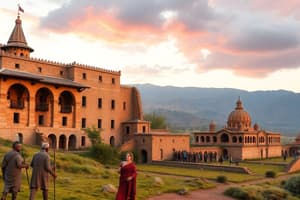Podcast
Questions and Answers
What is the primary focus of the study of history?
What is the primary focus of the study of history?
- To predict future events
- To understand human behavior and progression over time (correct)
- To create artistic representations of past events
- To document recent changes in technology
Which period is characterized by the emergence of writing systems?
Which period is characterized by the emergence of writing systems?
- Ancient History (correct)
- Middle Ages
- Renaissance
- Prehistoric Era
What significant development occurred during the Middle Ages?
What significant development occurred during the Middle Ages?
- The beginning of the Industrial Revolution
- The rise of feudalism (correct)
- Discovery of America
- The steam engine was invented
Which of the following was a key theme in the study of history?
Which of the following was a key theme in the study of history?
During which historical period did the Renaissance take place?
During which historical period did the Renaissance take place?
What is a primary source in historical research?
What is a primary source in historical research?
Which major event is part of modern history?
Which major event is part of modern history?
Why is studying history important?
Why is studying history important?
Flashcards are hidden until you start studying
Study Notes
Overview of History
- Definition: Study of past events, societies, and cultures; aims to understand human behavior and progression over time.
Major Historical Periods
-
Prehistoric Era
- Time before written records.
- Divided into the Stone Age, Bronze Age, and Iron Age.
-
Ancient History (c. 3000 BC - AD 500)
- Emergence of writing systems (e.g., cuneiform, hieroglyphs).
- Significant civilizations: Mesopotamia, Ancient Egypt, Indus Valley, Ancient China, and Mesoamerica.
-
Classical Antiquity (c. 500 BC - AD 500)
- Rise of empires: Roman Empire, Persian Empire, and Mauryan Empire.
- Philosophical advancements (e.g., Socrates, Plato, Confucius).
-
Middle Ages (c. 500 - 1500)
- Feudalism and the rise of kingdoms in Europe.
- Byzantine Empire and Islamic Golden Age.
-
Renaissance (14th - 17th Century)
- Revival of art and learning in Europe.
- Key figures: Leonardo da Vinci, Michelangelo, Galileo.
-
Modern History (17th Century - Present)
- Enlightenment ideas; rise of democratic and scientific revolutions.
- Major events: Industrial Revolution, World Wars, Cold War.
Significant Themes in History
- Political Developments: Formation of governments, revolutions, and alterations in power dynamics.
- Economic Changes: Trade routes, industrialization, and the rise of capitalism.
- Social Structures: Class systems, gender roles, and cultural norms.
- Cultural Development: Art, religion, philosophy, and communication advancements.
Methods of Historical Research
- Primary Sources: Original documents, artifacts, and firsthand accounts.
- Secondary Sources: Interpretations and analyses based on primary sources.
- Historiography: Study of how history is written and the perspectives of historians.
Importance of Studying History
- Provides context for current events.
- Enhances critical thinking and analytical skills.
- Fosters understanding of different cultures and societies.
- Helps prevent the repetition of past mistakes.
History: Understanding the Past
- History studies past events, societies, and cultures to understand human behavior and progression over time.
Key Historical Periods
- Prehistoric Era: The time before written records, divided into the Stone Age, Bronze Age, and Iron Age.
- Ancient History (c. 3000 BC - AD 500): The emergence of writing systems, like cuneiform and hieroglyphs, and major civilizations like Mesopotamia, Ancient Egypt, Indus Valley, Ancient China, and Mesoamerica.
- Classical Antiquity (c. 500 BC - AD 500): The rise of powerful empires such as the Roman, Persian, and Mauryan Empires, alongside advancements in philosophy by thinkers like Socrates, Plato, and Confucius.
- Middle Ages (c. 500 - 1500): The establishment of feudalism and kingdoms in Europe, alongside the Byzantine Empire and the Islamic Golden Age.
- Renaissance (14th - 17th Century): A revival of art and learning marked by key figures like Leonardo da Vinci, Michelangelo, and Galileo.
- Modern History (17th Century - Present): Characterized by Enlightenment ideas, democratic and scientific revolutions, major events including the Industrial Revolution, World Wars, and the Cold War.
Key Themes in History
- Political Developments: Significant changes in government systems, revolutions, and shifts in power dynamics.
- Economic Changes: The evolution of trade routes, industrialization, and the rise of capitalism.
- Social Structures: Changes in class systems, gender roles, and cultural norms.
- Cultural Development: Advancements in art, religion, philosophy, and communication.
Methods of Historical Research
- Primary Sources: Original documents, artifacts, and firsthand accounts provide direct insights into past events.
- Secondary Sources: Interpretations and analyses based on primary sources offer different perspectives on historical events.
- Historiography: The study of how history is written and the perspectives of historians helps understand the evolution of historical narratives.
Importance of Studying History
- ** Context for Current Events:** Understanding historical context helps interpret and analyze contemporary events.
- ** Critical Thinking and Analysis:** Studying history enhances analytical skills and critical thinking by examining historical evidence and perspectives.
- ** Cultural Understanding:** History helps appreciate diverse cultures and societies by offering insights into their development and interactions.
- ** Preventing Past Mistakes:** Learning from historical events can help avoid repeating past mistakes and build a better future.
Studying That Suits You
Use AI to generate personalized quizzes and flashcards to suit your learning preferences.



